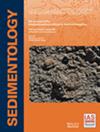Hydrothermal activity near the Permian–Triassic transition in the south‐western Ordos Basin, China: Evidence from carbonate cementation in Upper Permian sandstones
IF 2.8
2区 地球科学
Q1 GEOLOGY
引用次数: 0
Abstract
Carbonate cementation in the Upper Permian sandstones informs the timing and temperature of hydrothermal activity in the south‐western Ordos Basin. This study presents a detailed examination of these hydrothermally influenced carbonate cements, constraining their age, carbonate diagenesis and relationship with regional geodynamic evolution. Sedimentological analyses demonstrate the development of deltaic plain and front sand bodies in the study area, which resulted in interbeds of volcanic matrix‐rich sandstones with matrix‐free sandstones. Petrography and electron microprobe analysis reveal four carbonate mineral growth phases of matrix‐free sandstones in the following sequence; scarce pure siderite, scarce Mg‐rich siderite, abundant blocky calcite and moderately abundant grain‐replacing calcite. The fluid inclusion data show anomalies of homogenization temperature of blocky carbonate cements during early diagenesis, over a wide range of中国鄂尔多斯盆地西南部二叠纪-三叠纪过渡带附近的热液活动:上二叠统砂岩中碳酸盐胶结的证据
二叠纪上统砂岩中的碳酸盐胶结物为鄂尔多斯盆地西南部热液活动的时间和温度提供了信息。本研究详细考察了这些受热液影响的碳酸盐胶结物,对其年龄、碳酸盐成因以及与区域地球动力演化的关系进行了约束。沉积学分析表明,研究区三角洲平原和前缘砂体的发育,导致富含火山岩基质的砂岩与不含基质的砂岩互层。岩相学和电子微探针分析表明,无基质砂岩的碳酸盐矿物生长阶段有以下四种:稀少的纯菱铁矿、稀少的富镁菱铁矿、丰富的块状方解石和适度丰富的晶粒置换方解石。流体包裹体数据显示,在早期成岩过程中,块状碳酸盐胶结物的均质化温度在约 148 至 228°C 的大范围内存在异常。此外,块状碳酸盐胶结物显示出较低的δ13C(-5.9至-13.1‰ Vienna PeeDee Belemnite)和δ18O(紧密聚集在-12.4至-14.6‰ Vienna PeeDee Belemnite)值,解释为胶结过程中温度升高所致,与鄂尔多斯盆地西南边缘大洋地壳俯冲引发的基底断层活化和热液侵入有关。利用原位方解石U-Pb地质年代,热液活动的时间被确定为约247.0 ± 11至248.2 ± 4.7 Ma。这项工作为应用晶间方解石 U-Pb 测定法确定沉积盆地流体流动的绝对时间提供了一个案例研究,为捕捉沉积物中各种成岩演化阶段的快照提供了巨大的潜力。所提出的成岩模式还能为受热液影响的沉积物提供新的见解和认识。更重要的是,热液活动开始的时间可能比以前认为的要早。北秦岭造山带的隆升和相关的绵鲁洋壳俯冲可能始于二叠纪-三叠纪过渡时期,在鄂尔多斯盆地西南部发生了旷日持久的热液活动。
本文章由计算机程序翻译,如有差异,请以英文原文为准。
求助全文
约1分钟内获得全文
求助全文
来源期刊

Sedimentology
地学-地质学
CiteScore
8.20
自引率
11.40%
发文量
94
审稿时长
6-12 weeks
期刊介绍:
The international leader in its field, Sedimentology publishes ground-breaking research from across the spectrum of sedimentology, sedimentary geology and sedimentary geochemistry.
Areas covered include: experimental and theoretical grain transport; sediment fluxes; modern and ancient sedimentary environments; sequence stratigraphy sediment-organism interaction; palaeosoils; diagenesis; stable isotope geochemistry; environmental sedimentology
 求助内容:
求助内容: 应助结果提醒方式:
应助结果提醒方式:


